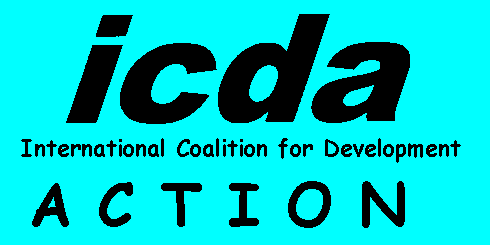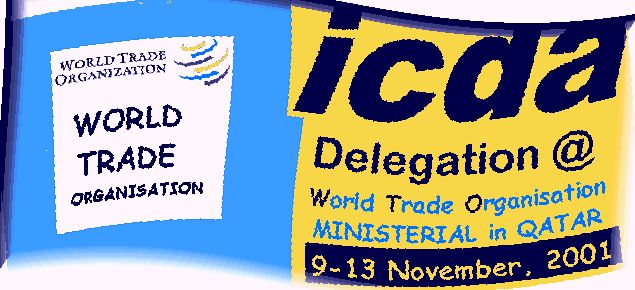
This site is best viewed with
| ICDA LATEST |
ICDA Latest News
Programme areas
ICDA History
| ICDA MEMBERS |
Current Members
| WTO IMPACT LIST |
Subscribe Here
What do you think?
| CENNT |
Latest News
IWGGT (in construction)
| PUBLICATIONS |
Latest ICDA Journal (in construction)
Latest ICDA Update (in construction)
| VACANCIES |
Internship
Book Keeper/Part time administrative Assistant
| HELP |
FAQ's
About Us
Contact Us

| BACKGROUND >> TRADE POLICY -- WHO DUZZIT? |
| By: The Economist -- (Published: 01-Mar-01) |
WASHINGTON, DC - UNLIKE most countries, America has no trade minister. That’s fine as long as someone emerges as the pre-eminent force on trade issues, as Charlene Barshefsky, the former trade representative, did in the last administration. But in the supposedly tight ship run by George Bush, trade policy finds itself down in the galley--caught by hungry wonks in a tug-of-war in which personal stature, as well as ideology, is at stake.
The power-grab began in the White House before Ms Barshefsky’s successor was named. Both Lawrence Lindsey, the president’s chief economic adviser, and Condoleezza Rice, the national security adviser, made early claims on the trade brief. Mr Lindsey, despite the domestic focus that has hitherto dominated his career, wants a say in all things economic. Ms Rice, a student of political economy but no expert on multilateral negotiations, believes that international trade helps to determine national security.
Of the two, Mr Lindsey is closer to the president’s ear. Nevertheless, their dual claim has led to the unprecedented appointment of a joint underling: Gary Edson, the deputy assistant for international economic affairs, who started work this week. Mr Edson, who served as chief of staff for the previous Bush administration’s trade representative, Carla Hills, will report to Mr Lindsey and Ms Rice. Mr Edson recently added a big gun to his team in the person of Peter Allgeier, a framer of the Free-Trade Agreement of the Americas.
Another White House trademonger and veteran of the first Bush administration is Joshua Bolten. Mr Bolten, the president’s deputy chief of staff, was Ms Hills’s general counsel for three years. Karl Rove, one of the president’s most trusted backroom voices on virtually every issue, is nominally his subordinate. Mr Bolten was widely cited as a contender for the post of trade representative, now filled by Robert Zoellick, and he will lead the effort to reinstate trade promotion authority (TPA) for his boss. Formerly known as “fast-track”, TPA allows the president to negotiate details of trade pacts without congressional interference.
Mr Zoellick, a protégé of James Baker with a thick resumé from the Reagan and earlier Bush administrations, may find himself at odds with the White House. For starters, the battle for TPA--which Ann Veneman, the agriculture secretary, recently called the administration’s top trade priority--is not an attractive one for Mr Zoellick to fight. His post might have lost its cabinet-level status were it not for interventions by members of Congress; some see him as their man at the big table. But Democrats in Congress also harbour doubts about giving up their power to add labour standards to trade deals, a practice Mr Zoellick opposes. Pushing for TPA will require some serious horse-trading.
Mr Zoellick also considers engaging America’s biggest trading partners more important than conquering Latin American markets--the favourite goal of the Bush administration. In a 1999 essay, Mr Zoellick wrote that America should concentrate on overhauling relations with Europe and Japan. He repeated this point in his confirmation hearings and plans to work with Pascal Lamy, a long-time friend and Europe’s trade commissioner, to build momentum for the new round of multilateral trade talks. Mr Zoellick may find that his ideas place him outside Mr Bush’s inner circle.
Paul O’Neill, the new treasury secretary, shares Mr Zoellick’s global outlook and carries ammunition that makes him hard to ignore: the government’s purse-strings and the cautious faith of corporate America. But Messrs O’Neill and Zoellick could both be trumped by Donald Evans, the commerce secretary. Mr Evans ran Mr Bush’s campaign for the White House and is the closest cabinet member to the president’s ear. On the other hand, he could be tainted by his department’s protectionist tendencies.
The wild card in this race resides in the State Department, with the under-secretary for economic affairs. That person could truly compete for pre-eminence in trade, according to Sidney Weintraub, a veteran diplomat and scholar based at the Centre for Strategic and International Studies (which Mr Zoellick used to head). There’s a problem, though--no one has been named to the post.
The situation in Washington is made all the more mysterious by the cocoon in which Mr Zoellick has enveloped himself. Although Messrs Evans, Lindsey and O’Neill and Ms Rice have all spoken to the press, Mr Zoellick has kept mum. He has yet to fill nine senior posts (including Mr Allgeier’s) on his staff and is expected to be incommunicado for a few more weeks. In the meantime, others may be tempted to take over.
Please click here to go back to WTOMC Page
Copyright ©E.K.BENSAH II PRODUCTIONS. 1998-2001